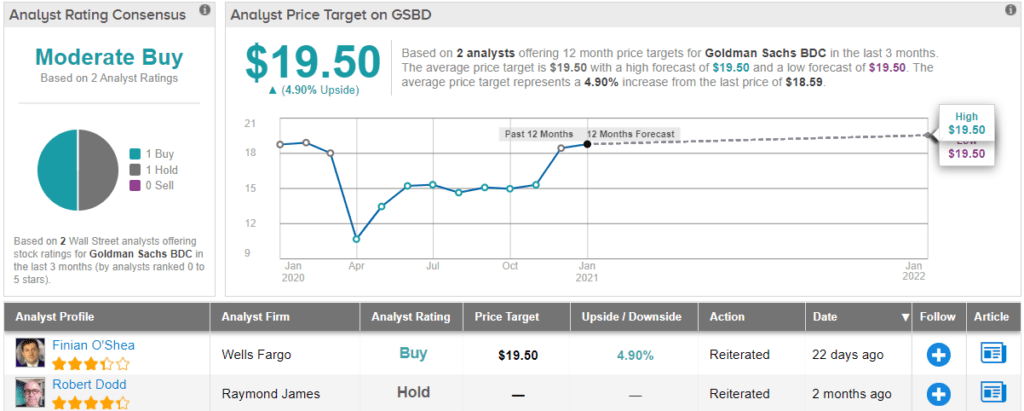With the Georgia election behind us, and the Trump Administration on the way out, the near- to mid-term political landscape is growing clearer: The Biden Administration will be able to cater to its progressive base, now that it rests on majorities – however thin – in both Houses of Congress. Predictability is good for the markets, and we’re likely to have that, at least until 2022. Which makes this the time to lock in the defensive portfolio plays.
Discover the Best Stocks and Maximize Your Portfolio:
- See what stocks are receiving strong buy ratings from top-rated analysts.
- Filter, analyze, and streamline your search for investment opportunities with TipRanks’ Stock Screener.
The research analysts at Wells Fargo have been searching the markets for the ‘right’ buys, and their picks bear a closer look. They’ve been tapping high-yielding dividend payers as an investment play of choice.
The TipRanks database sheds some additional light on three of the firm’s picks – stocks with dividends yielding 8% or better.
Apollo Investment Corporation (AINV)
One good place to look for high return dividends is among the market’s business development companies. These companies offer specialty financing to the middle market, providing credit and funding for small to medium business customers who would otherwise have difficulty accessing capital markets.
Apollo Investment is a typical example, with an investment portfolio valued at $2.59 billion. Apollo has investments in 147 companies, with average exposure of $15.9 million. The bulk of its portfolio, 86%, is first lien secured debt. Healthcare, business services, aviation and transport, and high-tech companies make up more than half of Apollo’s investment targets.
In Q3CY20 (the company’s fiscal Q2 of 2021), Apollo posted an EPS of 43 cents per share, flat sequentially but down 18% year-over-year. The company boasted $268 million available liquid assets, and $287 million in available credit under its secured facility at the end of the quarter. Since then, Apollo has amended its revolving credit facility by extending maturity to December 2025.
On the dividend front, Apollo has maintained its payments to regular shareholders despite the corona pandemic. Apollo’s most recent payment, in November, was s 31-cent regular dividend plus a 5-cent special dividend. The current yield is an impressive 11.6%.
Covering AINV for Well Fargo, analyst Finian O’Shea noted, “Legacy’s impact has whittled away, adding just $3 million to the top line this quarter, for an annualized yield on FV of ~5.5%. We think there is very little downside to NOI from the legacy book, and view any realizations and re-deployments as a big positive to the stock.”
O’Shea gives Apollo an Overweight (i.e. Buy) rating, and a price target which, at $12.50, implies a 12% upside from current levels. (To watch O’Shea’s track record, click here)
Overall, Apollo has two reviews on record, and they are split – 1 Buy and 1 Hold – for a Moderate Buy consensus view. The stock is selling for $11.17, and its $11.50 average price target suggests a modest 3% upside. (See AINV stock analysis on TipRanks)
Goldman Sachs BDC (GSBD)
Next up, Goldman Sachs BDS, is the banking giant’s entry into the specialty finance business development segment. GSBD is a subsidiary of Goldman, and focuses on mid-market companies, providing closed-end management investment services and middle-market credit access.
GSBD’s share performance in 2020 showed a steady rebound from the initial recession caused by the corona crisis last winter. By year’s end, the stock was trading its January 2020 levels.
In November, the company felt confident enough to price an offering of $500 million in unsecured notes, at interest of 2.875% and due in January 2026. The funds raised will be used to pay down the revolving credit facility, improving interest on existing debt.
Also in November, GSBD reported 80 cents EPS for the quarter ending September 30. The earnings were strong enough to support a solid dividend of 45 cents per share – and the company announced a special dividend payment, of 15 cents, to be paid in three installments during 2021. The regular dividend currently has a yield exceeding 9%.
Among the bulls is Wells Fargo’s Finian O’Shea, who also covers AINV. The analyst wrote, “[We] believe the high-quality investment platform and shareholder friendly structure will continue to drive attractive forward returns… GSBD is quality at a good price… For those who buy BDCs, GSBD will likely always be in the portfolio discussion as we see it, given its quality of earnings and shareholder orientation.”
With that in mind, O’Shea rates GSBD an Overweight (i.e. Buy), along with a $19.50 price target. This figure implies a 5% upside from current levels. (To watch O’Shea’s track record, click here)
Once again, this is a stock with an even split between Buy and Hold reviews, making for a Moderate Buy analyst consensus rating. The shares are priced at $18.59 and the average price target of $19.50 matches O’Shea’s. (See GSBD stock analysis on TipRanks)
ExxonMobil (XOM)
From BDCs we’ll move on to the oil industry. Exxon Mobil is one of Big Oil’s players, with a market cap of $190 billion and 2019 revenues (the last year for which full-year figures are available) of $264.9 billion. The company produces approximately 2.3 billion barrels of oil equivalent daily, putting it in the top five of global hydrocarbon producers.
Low prices in 2H19, and the corona crisis in 1H20, drove revenues down in the first part of last year – but that reversed in Q3 when XOM reported $45.7 billion at the top line. While down year-over-year, this was up 40% sequentially.
Despite all of the headwinds facing the oil industry over the past 18 months, XOM has kept its dividend reliable, and paid out the most recent distribution in December 2020. That payment was 87 cents per regular share, annualizing to $3.48 and giving a yield of 8.4%.
In a note on the big oil companies, Wells Fargo’s Roger Read writes, “In 2021, we expect more supportive macro tailwinds, but realize significant challenges exist and maintain an average Brent price below $50…”
Switching his view to XOM in particular, the analyst adds, “We do not expect production growth and only minimal free cashflow generation, which is inclusive of disposition proceeds. However, this represents a significant change from the last several years of significant cash burns and increased leverage. In our view, this is likely enough to lift the shares a bit higher and lessen worries about dividend sustainability.”
In light of his comments, Read rates XOM shares an Overweight (i.e. Buy), and his $53 price target indicates room for 17% upside growth in the coming year. (To watch Read’s track record, click here)
That Wall Street still views the energy industry with a cautious eye is clear from XOM’s analyst consensus rating — Hold. That is based on 10 reviews, including 3 Buys, 6 Holds, and 1 Sell. The shares are selling for $45.15, and their $47.33 average price target suggests a modest upside of ~5% (See XOM stock analysis on TipRanks)
To find good ideas for dividend stocks trading at attractive valuations, visit TipRanks’ Best Stocks to Buy, a newly launched tool that unites all of TipRanks’ equity insights.
Disclaimer: The opinions expressed in this article are solely those of the featured analysts. The content is intended to be used for informational purposes only. It is very important to do your own analysis before making any investment.












